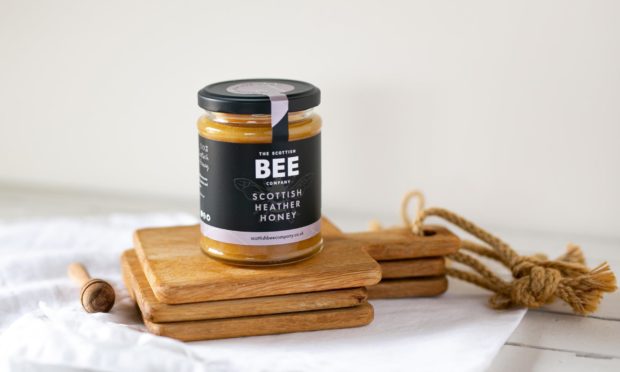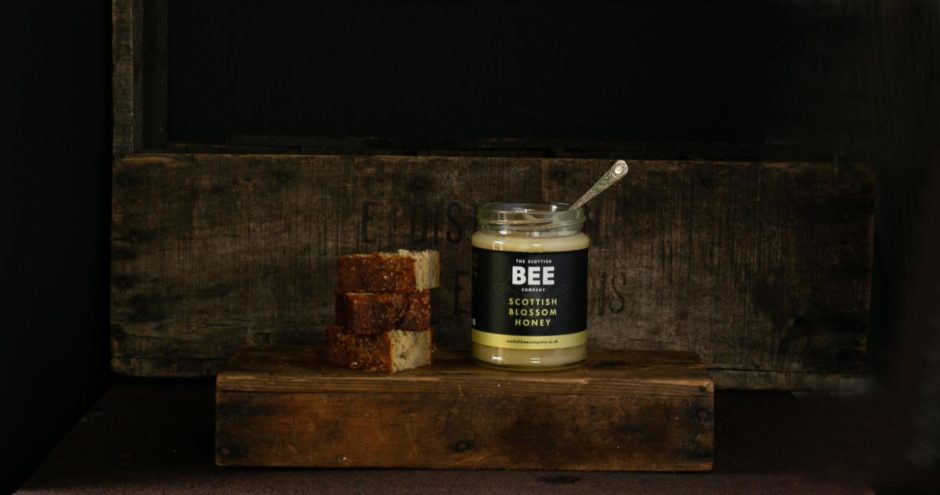Following in the footsteps of several of Scotland’s whisky producers, The Scottish Bee Company is taking its honey to the Far East markets of Japan and Singapore.
When nature lovers Iain and Suzie Millar learned about the decline in the country’s bee population as well as the UK’s habit of importing much of its honey, the couple came up with a solution – to set up The Scottish Bee Company.
That was in 2017, and in just two years they increased bee numbers in Aberdeenshire, Fife and Perthshire, and much of the central belt by around 23 million, started Scotland’s first bee farming apprenticeship, launched their sister charity Repollinate.org.uk, tripled sales year on year, trained as Sommeliers in honey and won a Great Taste Award for their heather honey.
But this looks to be only the beginning of their success, as they turn to Asia where there is increasing demand for premium Scottish products. Over the next 12 months, around £100,000-worth of Scottish Bee Co’s heather and blossom honey will be exported to the Far East, with several of their products heading straight for high-end health stores and speciality food retailers.
Suzie Millar, co-founder of The Scottish Bee Company, said: “We’re really excited to be following in the footsteps of Scotch whisky by bringing our own unique taste of Scotland to the Far East.
“Foodies in Japan and Singapore demand premium quality honey like ours, so it’s a buoyant market. They test everything and want to know that they are getting a great-tasting product with clear health benefits. It’s good to know that even during a global pandemic that we’re doing our bit to help drive Scotland’s position as a global leader for healthy and functional food.”
With support from the Scottish Business Network and The Honey Colony in Singapore, it has taken a year of planning and negotiations for The Scottish Bee Company to finally access the Far East market with its ‘superfood’ product.
Suzie said: “We’ve been working with the Scottish Business Network, who put us in touch with somebody who put us in touch with The Honey Colony, who are based in Singapore. So, we did a deal with them and they helped us find a further deal in Japan.
“The Japanese are really into their honey and they understand what good-quality honey is. Everything we send over there has had a ridiculous number of tests done on it – in a good way – but it’s maybe more than other places would have had to do. It’s good, because then at least they know what they’re buying, and that is good-quality honey.”
Suzie adds that despite the extra demand, there won’t be any change to the product, though there are likely to be new employment opportunities as a result of the expansion.
“We won’t have to change anything to appeal to the Far East market, it’s still going to be the same honey, same branding as it is just now.
“We’ve already taken on an extra person one day a week to help with the export sales, which will hopefully increase into a full-time role. Then we’ll be looking to take on another couple of people – one over the winter then another in the spring.”
“We’re now planning to do more work to develop our export activity in the USA and Europe. The Scottish Bee Company’s online shop is already able to ship throughout Scotland, the rest of the UK, northern Europe and the USA within seven days.”
Scottish heather honey is amongst the world’s top manganese containing food products. Manganese is an essential mineral. As well as its high antioxidant qualities, it plays a role in helping to make and activate enzymes in the body involved in protecting tissues from damage and in the metabolism of nutrients. It also helps maintain healthy bones.
Demand for Scottish heather honey in general overseas seems to be growing, with a Perthshire-based honey producer announcing in May that it had agreed a US-export deal to supply a Texas supermarket chain.
Heather Hills Farm will supply its signature heather honey and raspberry jam to Austin-based Central Market, which operates from 10 locations.


